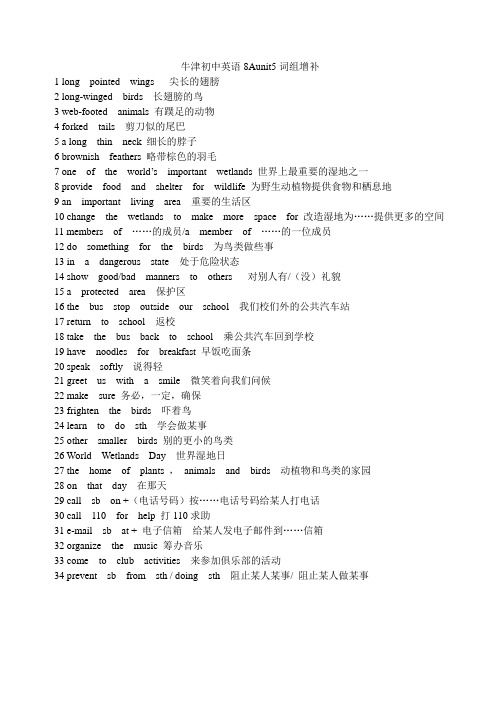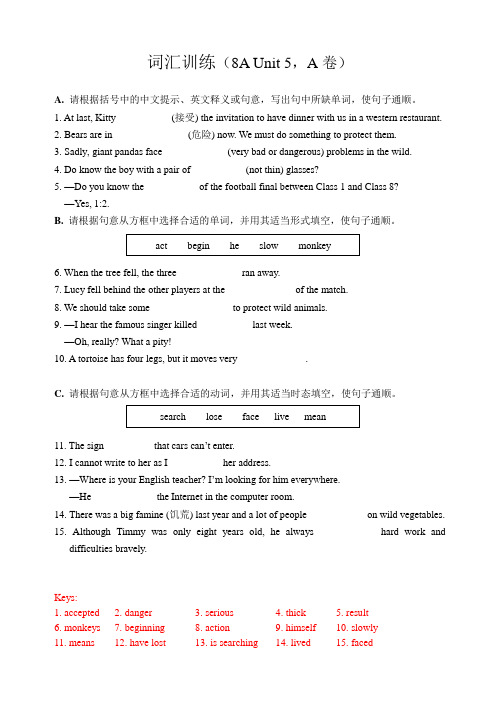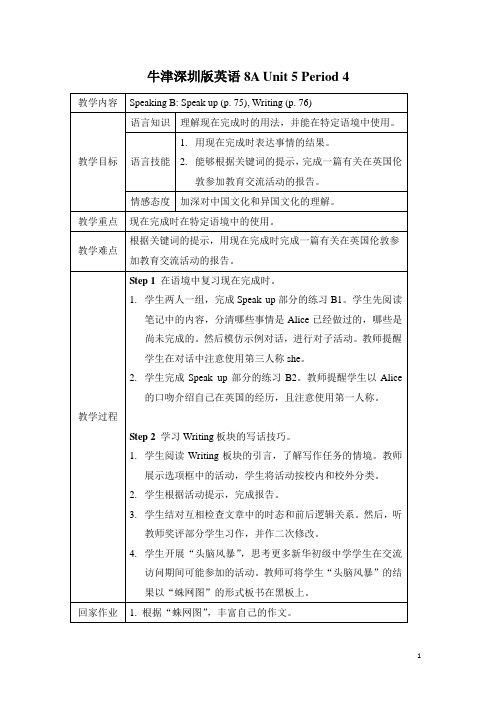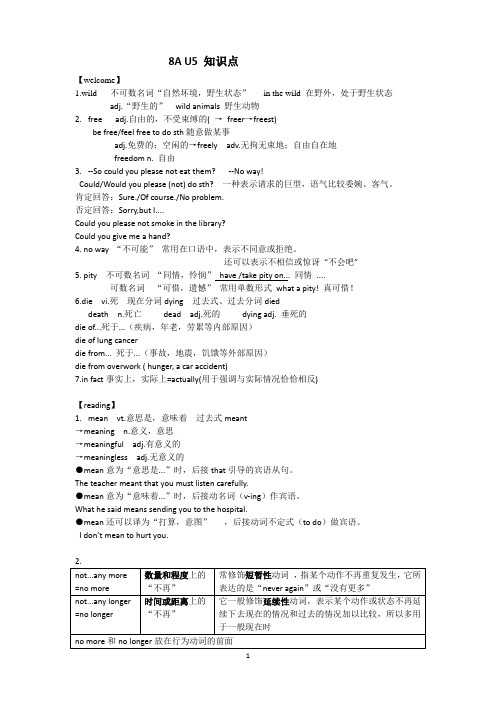8A Unit 5-8 (Speak up & Study skills)
8Aunit5--unit6词组

牛津初中英语8Aunit5词组增补1 long pointed wings 尖长的翅膀2 long-winged birds 长翅膀的鸟3 web-footed animals 有蹼足的动物4 forked tails 剪刀似的尾巴5 a long thin neck 细长的脖子6 brownish feathers 略带棕色的羽毛7 one of the world’s important wetlands 世界上最重要的湿地之一8 provide food and shelter for wildlife 为野生动植物提供食物和栖息地9 an important living area 重要的生活区10 change the wetlands to make more space for 改造湿地为……提供更多的空间11 members of ……的成员/a member of ……的一位成员12 do something for the birds 为鸟类做些事13 in a dangerous state 处于危险状态14 show good/bad manners to others 对别人有/(没)礼貌15 a protected area 保护区16 the bus stop outside our school 我们校们外的公共汽车站17 return to school 返校18 take the bus back to school 乘公共汽车回到学校19 have noodles for breakfast 早饭吃面条20 speak softly 说得轻21 greet us with a smile 微笑着向我们问候22 make sure 务必,一定,确保23 frighten the birds 吓着鸟24 learn to do sth 学会做某事25 other smaller birds 别的更小的鸟类26 World Wetlands Day 世界湿地日27 the home of plants ,animals and birds 动植物和鸟类的家园28 on that day 在那天29 call sb on +(电话号码)按……电话号码给某人打电话30 call 110 for help 打110求助31 e-mail sb at + 电子信箱给某人发电子邮件到……信箱32 organize the music 筹办音乐33 come to club activities 来参加俱乐部的活动34 prevent sb from sth / doing sth 阻止某人某事/ 阻止某人做某事牛津初中英语8Aunit6词组1 really warm 确实暖和2 stay here for too long 呆在这儿太久3 mop sth up / mop up sth 把某物拖干净4 natural disasters 自然灾害5 bad weather 坏天气6 lose the game 输了比赛7 thousands of people 成千上万的人们8 a car accident 一起车祸9 crash into 撞到……上10 wash sth away / wash away sth 把……冲走11 fall (down)from 从……摔下来12 thunder and lightning 雷电13 survive the earthquake 在地震中幸存下来14 at first 起先15 feel a slight shaking 感到一阵轻微的震动16 hear a big noise like thunder 听到像雷一样的一阵巨响17 look at each other in fear 惊恐地互相看看18 like bombs below the ground 像地下的炸弹爆炸一样19 run in all directions 向四面八方逃跑20 run out of the shopping center 跑出购物中心21 run out to the street 跑到街上22 pieces of glass 玻璃碎片23 fall down 摔下来24 come down 倒下25 calm down 安静下来26 be trapped 陷入困境27 say to oneself 自言自语28 a moment of fear 片刻的恐惧29 shout /scream for help 大声喊救命30 stay alive 活着31 have a packet of chocolate 吃一袋巧克力32 hear excited shouts 听到兴奋的叫喊声33 in a great hurry (to do sth )极为匆忙地(做某事)34 move sth away / move away sth 把……搬走35 the noise of thunder 雷声36 sound like 听起来像……37 (be)around 7 7摄氏度左右38 drop a little 下降一点39 become / get worse 变得更糟40 drop to -5 降到零下5摄氏度41 be sunny / cloudy /foggy / frosty / stormy 晴朗的/多云的/有雾的/有霜的/暴风雨的天气42 make excuses / make an excuse 找借口43 get all wet (混身)湿透了44 tell / ask sb (not)to do sth 叫某人(别)做某事45 advise sb (not)to do sth 建议某人(不要)做某事46 order sb (not)to do sth 命令某人(不要)做某事47 lock the door 锁门48 run down the stairs 跑下楼梯49 walk out of the classroom one by one 一个接一个走出教室50 an accident report 一份事故报告51 cover……with 用……覆盖……52 be covered with 被……覆盖53 call the 110 hotline 打110热线54 be serious 严重的something serious 一些严重的事55 time of arrival 到达的时间56 conditions of victims 受害者的情况57 hear about / of 听说58 a heavy storm with thunder and lightning 一阵大风暴伴随着雷电声59 catch/ cause fire 引起火灾60 be (badly)hurt (严重)受伤61 continued to do sth 继续做(同一件)事62 fall over 绊倒63 do nothing but do sth 除了做某事外不做任何事64 hear the noise of traffic 听到车辆的声音65 look out of the window 朝窗外看66 remove the snow 把雪移走67 turn off the lights 关灯68 typhoon signal number 台风信号68 snowstorm warning 风雪警报69 roll up trousers 卷起裤子70 in the wind 在风中。
8A Unit Five 教案汇总

8A Unit Five BirdwatchersPeriod OneTeaching content: Comic strips & Welcome to the unitTeaching goals:1、To introduce the topic ‘birdwatchers’ to students and get them ready to talk about birds2、To learn about the names of birds3、To talk about their favourite birdsTeaching important & difficult points:1、Words: northern, birdwatcher, birdwatching, toast, yummy, crane, beak, seagull, long-winged,web-footed, sparrow, swallow, long-pointed, forked, swan, golden eagle,brownish, broad, hooked2、Phrases: go birdwatching, at the market, black feathers, fly to northern countries, long thinneck, broad wings, like the parrot best, long-pointed wings, colourful feathers3、To express opinions about birdsTeaching Procedures:Step 1 Warming-up1. Before class, play a song called ‘Cuckoo! Cuckoo!’2. Show a piece of music (there is sound by birds). After students listen to the music, have a free talk with students:T: Is it nice?T: What kinds of animal make the sound?T: Do you like birds?T: Would you like to go and see the birds?T: Let’s go birdwatching. Let’s be birdwatchers.(Teach the words ‘birdwatching’and ‘birdwatcher’)Step 2 Presentation1.Talking about birds.T: I’ll show you some pictures of birds, let me check how well you know about birds.(T points to the different parts of the bird and ask: What do we call this part? Teach new words. While talking the bird, help Ss to describe the bird. T may ask questions like: What does a sparrow look like? Is it big or small? Does it have beautiful feathers? What colour are the feathers? What about the beak? Is it short or long?)2. Finishing the exercises on P75, check the answers.3. Read the names of birds together.Step 3 Consolidation1.Guessing game: T may ask the Ss to draw lots and then guess what kind of birds it is.The bird has colourful feathers. It can learn to speak or sing. What bird is it? (A parrot)It has long pointed wings and forked tail. (A swallow)It has many long things like a beak and a neck. (A crane)It has brown and grey feathers. (A sparrow)It has white feathers. (A swan)It has broad wings and hooked beak. (A golden eagle)It has web-footed feet. (A seagull)2. Show all the pictures and get the students to give their names, and invite the students to organize it into a passage. (e.g. A swallow has long-pointed wings and forked tail. It flies to the northern countries in summer.)3. Pair-work: (work in pairs to make a dialogue)A: Which bird do you like best?B: I like the parrot best.A: Why?B: Because it has colourful feathers.Step 4 Presentation and practice (comic strip)1.T: Eddie loves birds too. Now Eddie is going to the market tomorrow. What is he going todo there? Is Eddie a birdwatcher? Why? (Show the slides to Ss to arouse their interest.)2.Listen to the tape and answer some questions:What is Eddie going to do? (Eddie is going birdwatching.)Does he really love birds? (No.)What kind of birds does he like best? (He likes Beijing ducks and roast chickens.)3. Check the answers.4. Get some pairs to act out the part according to the pictures on the slide show.Step 5 Discussion1.Show a flash to the students (‘birds are in danger’)2.Discuss the following questions in group of 4What danger may the birds have now? (Pollution, loss of living areas etc.)What action can we take to help them? (Ask more people to help birds, build reserves etc.) Step 6 SummaryT: we learned the names, characteristics and appearance of birds, and we all know that the birds are in danger now, we must try our best to protect them.Step7 Homework1.Listen to the tape for the new words and pay attention to the pronunciation and intonation.2.Finish off the exercises in the books.3.Look for more information about birds.8A Unit Five BirdwatchersPeriod TwoTeaching content: Reading (I)Teaching goals:1、To infer the general meaning from title and context.2、To check understanding by evaluating sentences3、To skim text for overall meaning and scan for detailsTeaching important & difficult points:1、New words: nature, provide, wildlife, comfortably, round, while, easily, space, farm,government, tourist, importance, actively, wet, wetland, shelter, rare,red-crowned crane, endangered2、The problems with wildlife to survive in the wild and the solution of them.Teaching Procedures:Step 1 Revision1.Show some pictures of birds to students, ask students to say out the names and characteristicof these birds. (To revise crane, beak, seagull, long-winged, web-footed, sparrow, swallow, long-pointed, forked, swan, golden eagle, brownish, broad, hooked)2.Pair-work. Work in pairs to make a dialogue.A: Which bird do you like best?B: I like the parrot best.A: Why?B: Because it has colourful feathers.Step 2 Presentation1.Lead-in(T shows two pictures of endangered birds to students.) T: We learnt a lot about different kinds of birds. Have you seen all these birds before? These birds are beautiful and lovely, but some of them are rare now. Look at the two pictures, they are endangered. (Teach rare and endangered.) Many birds are endangered. What can we do? We can build nature reserves for the birds. The Chinese government is building more nature reserves for the birds. Zhalong is one of them. Today we are going to learn something about Zhalong.2. Play a video of Zhalong nature reserve to students, let students say out what kinds of animals live in Zhalong, T introduce Zhalong nature reserve to the Ss while teaching the new words Step 3 Reading.1.Get the class to listen to the tape and try to find out the general idea about the text.2.Read paragraph1-2, pair students ask and answer questions:What does this area provide for wildlife?What kinds of wildlife live there?Do all the birds live in Zhalong all year round?What kind of bird is special in Zhalong?3.Read paragraph3-4, do true or false questions.There will be more and more space for wildlife. ( )More and more birds are in danger because they have less food, ( )Some people want to change wetlands into farms and buildings. ( )The Chinese government want to protect the endangered birds in nature reserves. ( )4.Read paragraph5-6, fill in the blanks.A lot of ________ go to Zhalong to _______ birds every year. _________ of Birdwatchingclub are going to ________ the birds and the _________ in their __________. We do a bird count _______ a year. We want to _______ students to help us _______ and ______ something to help the birds. Some people do not ______ and _______ the importance of wetlands. We hope this _______ can make them _______ take _______ to _______wild life.5. Read the whole text aloud.Step 4 Consolidation1.Finish off the Exercise B on P782.Help students to find out the topic of each paragraph.Step 5 Activity (Discussion)Play a video of Yao Ming. (It’s about protecting the environment)T:As we all know that many birds are in danger now. We must take action to protect these endangered birds. From the text, we have known the different actions taken by government, tourists as well as Yao Ming. So what will you do to protect the endangered birds? Divied yourselves into a group of 4, discuss the ways to protect.Step 6 SummaryT: Protecting animals is to protect our future. We must try our best to protect these endangered animals,Step7 Homework1. Please remember all the new words and expressions by heart.2. Please read the text for many times after class and try to retell according to the table above.8A Unit Five BirdwatchersPeriod ThreeTeaching content: Reading (II)Teaching goals:1. To learn more details about Zhalong Nature Reserve.2. To analyze the sentences for students to get a better understanding.3. To make sure the students know the importance of wetlands and nature reserves.Teaching important & difficult points:1、To learn more details about Zhalong.2、To find out the useful language points in the text.Teaching Procedures:Step 1 Revision3.Reading.Play the tape twice for Ss to listen and repeat with books closed.Play the tape for individuals to repeat once.2. Review the context with the following questions:1).How long do the birds live in Zhalong?Many birds live all year round, and some go there for a short stay.2). Can you name a kind of birds? What do they eat?The red-crowned cranes. They eat fish in the wetlands.3). Why are more and more birds are in danger?Because they don’t have enough space.4). What are Birdwatching Club doing this year?They are studying the different kinds of birds in Zhalong and the changes in their numbers. 5).What does the club write this article for?They hope this will help most people understand and make them take action to protect wildlife.6). Different people’s actions:Some people: They want to change the wetlands to make more space for farms and buildings.Government: Chinese government wants to protect these endangered birds.Tourists: They go to Zhalong to watch birds.Members of Birdwatching Club: They are studying the different kinds of birds in Zhalong and the changes in their numbers.Many people: They do not understand the importance of wetlands.Step 2 Help Ss retellParagraph 1Zhalong is … It’s one … The area is …because it … It is …Paragraph 2Many birds …,some … There are …and the birds … Zhalong Nature Reserve is …for… There are not …in the world . … in ZhalongParagraph 3Some people want to … This means…Paragraph 4More and more ……in danger : …not have enough spaceMany…died. The Chinese government …,and Zhalong is …Paragraph 5Every year, a lot of tourists … This year, members …are studying…and …Paragraph 6We do …… We are now inviting … We need … and … Many people don’t … We hope …help them and make them ……1.T helps students retell.2.T divides the students into 4 groups to have a memory competition.(To check how well theyknow about the text)Step 3 PracticeFinish off the Exercise C on P79Step 4 Language points1. Some important phrases and sentences in the text.2. Some important language points:danger (dangerous, endangered); important (importance); big, large;space(不可数)make more space for farms and buildings使更多的空间成为农场和建筑物have enough space (to do ……) 有足够的空间(去做……)make more space/room for…The living space is less and less. = The living areas are fewer and fewer.do a bird count = count birdsless and less space for…catch …for foodprovide food and shelter for … (provide …with food and shelter)3. Do more exercises.Step 5 ActivityTalk about Zhalong.Work in groups of four, act as the following rollers:1. a worker in Zhalong2. a red-crowned crane3. a farmer4. a member of Birdwatching clubStep 6 SummaryStep 7 Homework1.Copy the language points and learn them by heart.2.Recite the whole text.8A Unit Five BirdwatchersPeriod FourTeaching content: Grammar A 、BTeaching goals:1. To know the five kinds of sentences structures.2. To understand the functions of different parts of speech in a sentence.3. To develop an understanding about when to use simple present tense to talk about future. Teaching important & difficult points:1、To identify and use the structure of 'Five kinds of sentence structures'2、To use simple present tense to talk about futureTeaching Procedures:Step 1 Warming-up activityT:Each word or phrase plays a part in the sentence. Different combinations of the elements form different sentence structures. Today we will learn the five basic sentence structures. First, let’s learn the parts of a sentence.主语(subject), 谓语动词(verb), 宾语(object), 表语(predicative), 状语(adverbial), 宾语补足语(object complement)Step 2 Presentation and practice1. Present the terms to Ss and help them to memorize them as quickly as they can.Subject ------SVerb ------VPredictive ------PDirect Object ------DOIndirect Object ------IDOObject Complement ------OCII. Ss practice speaking out the sentence structures individually.1. S + V.2. S + V + P.3. S + V + DO.4. S + V + IO + DO.5. S + V + DO + OC.Step 3 PracticeTry to name the proper sentence structure. (page 81)1. People call Zhalong Bird’s Home. (S + V + DO + OC.)2. The government built the nature reserve. (S + V + DO.)3. The sparrow is flying. (S + V.)4. The reserve gives wildlife an ideal home. (S + V + IO + DO.)5. The crane looks beautiful. (S + V + P.)6. The students are counting the birds. (S + V + DO.)7. Sandy thought herself a good birdwatcher. (S + V + DO + OC.)8. I found the article on wildlife interesting. (S + V + DO + OC.)Step 4 ProductionRearrange the words to form complete sentences1. teenagers, have, an, many, unhealthy, diet.2. makes, weak, your, body, unhealthy, diet, an.3. unhappy, they, are.4. find, difficult, homework, they, their.5. hobbies, teenagers, many, have.6. tired, they, are.7. write, letters, many, me, teenagers.8. cry, some, them, of.Step 5 Grammar B (Lead-in)1. Examples of sentences using the simple present tense to talk about the future.2 T: We can use the simple present tense to talk about the present. We can also use the simple present tense to talk about the future. We often use it for definite future plans. We use it when we talk about programmes, timetables and calendars.Step 6 Presentation1.用一般现在时表示将来时间,通常指按照时间表或既定日程一定会发生的将来的事情。
译林版英语八上5-8单元词汇练习

A. 请根据括号中的中文提示、英文释义或句意,写出句中所缺单词,使句子通顺。
1. At last, Kitty __________ (接受) the invitation to have dinner with us in a western restaurant.2. Bears are in ______________ (危险) now. We must do something to protect them.3. Sadly, giant pandas face ____________ (very bad or dangerous) problems in the wild.4. Do know the boy with a pair of __________ (not thin) glasses?5. —Do you know the __________ of the football final between Class 1 and Class 8?—Yes, 1:2.B.请根据句意从方框中选择合适的单词,并用其适当形式填空,使句子通顺。
6. When the tree fell, the three ____________ ran away.7. Lucy fell behind the other players at the _____________ of the match.8. We should take some ________________to protect wild animals.9. —I hear the famous singer killed __________ last week.—Oh, really? What a pity!10. A tortoise has four legs, but it moves very _____________.C.请根据句意从方框中选择合适的动词,并用其适当时态填空,使句子通顺。
2013新译林牛津英语8A 课文翻译

WORD格式-专业学习资料-可编辑绿茵教育个性化教案绿茵教育个性化教案(内页)学生姓名:年级:科目:授课日期:月日上课时间:时分------ 时分合计: 2 小时教学目标重难点导航教学简案:学生小结:教师评价:审核人签字:学生签字:教师签字:班主任签字:译林牛津2013版 8A课本翻译中文8AU1 Welcome P7丹尼尔:埃米,什么样的人适合做好朋友?埃米:嗔,好朋友应该诚实。
你可以信任他们,因为他们从不说谎。
丹尼尔:是的,那非常重要。
我认为好朋友也应该很有趣,他们会跟你讲有趣的笑话。
埃米:对,确实如此。
我还认为好朋友应该乐于助人。
丹尼尔:我赞同。
8AU1 Reading P8 最好的朋友贝蒂是我最好的朋友之一。
她很苗条并且留着短发。
贝蒂慷慨大方。
她乐意和朋友分享东西。
她也非常乐于助人,在任何时候都愿意帮助别人。
她帮助我做家庭作业,而且她总是将公交车上的座位让给有需要的人。
贝蒂有一副好嗓子。
她想长大后成为一名歌手。
我最好的朋友是马克斯。
他是我们班最高的男生将近1.75米。
他的眼镜片又小又圆。
这副眼镜让他看起来很聪明。
马克斯很有幽默感。
他讲很有趣的笑话并且经常让我捧腹大笑。
和他在一起,我从来没有感到无聊。
马克斯的腿很长,在课桌下面伸不开。
当他路过我们的课桌时,他总是将我们的书本和笔碰到地上。
马克斯就是这样有趣!梅是我最好的朋友。
她比我矮。
她有又大又亮的眼睛,又长又直的头发。
每个人都认为她很漂亮。
梅很可爱。
她经常微笑,并且从来不说任何人一句坏话。
梅是个真正的朋友。
当我有麻烦事的时候,我总是能去找她我可以告诉她任何事情,因为她能保守秘密。
8AU1 Integrated P13 未来的计划。
亲爱的日记,我长大后想当一名社会工作者。
我一向为人和善,在学校也有很多朋友。
我想遇见很多人并且和他们交朋友。
我能够仔细倾听别人的意见,也愿意帮助他们解决问题。
如果我能使其他人高兴,我将会感到非常开心。
8AU1 Speak up P14海伦:左边的男孩是谁?桑迪:噢,他是彼得。
译林版牛津英语8A全册知识点总结+测试

译林版⽜津英语8A全册知识点总结+测试译林版⽜津英语8A全册知识点总结+测试Unit 11.something to drink/eat ⼀些喝的/吃的东西2.数字+more = another +数字eg. three more = another three3.maybe adv. (副词),意思是“也许、可能”,在句中作状语,相当于perhaps,常位于句⾸在may be中,may是情态动词,be是动词原形,两者构成完整的谓语形式,与主语形成系表结构,意为“也许是、可能是”。
maybe和may be可相互转换。
He may be in the office.= Maybe he is in the office. 他或许在办公室。
You may be right.= Maybe you are right. 你或许是对的。
4.an honest boy ⼀个诚实的男孩adis honest boy ⼀个不诚实的男孩5.keep a secret = keep secret s保守秘密keep a diary = keep diar ies记⽇记6.share my joy 分享我的快乐7.have problem s(复数)(in) doing sth. = have trouble(不可数)(in) doing sth. = have difficulty (不可数)(in) doing sth. 做某事有困难8.believe what he says = believe his words 相信他所说的话9.tell lies 说谎tell stories 讲故事tell jokes 讲笑话lie v.动词,躺lie ---lay--lainn.名词,谎话tell lies 说谎10. interested adj.感到有趣的,⼀般修饰⼈interesting adj. 令⼈感到有趣的,⼀般修饰物interesting属外向性质的词,⽤于指⼈、事、物的外在影响⽅⾯,意为“使(外)⼈感兴趣的”;interested属内向性质的词,⽤于指⼈的内⼼感受⽅⾯,意为“(内⼼)对……感兴趣的”。
沪教版-英语-八上-Period 4 教学设计

教学内容
Speaking B: Speak up (p. 75), Writing (p. 76)
教学目标
语言知识
理解现在完成时的用法,并能在特定语境中使用。
语言技能
1.用现在完成时表达事情的结果。
2.能够根据关键词的提示,完成一篇有关在英国伦敦参加教育交流活动的报告。
2.学生完成Speak up部分的练习B2。教师提醒学生以Alice的口吻介绍Байду номын сангаас己在英国的经历,且注意使用第一人称。
Step 2学习Writing板块的写话技巧。
1.学生阅读Writing板块的引言,了解写作任务的情境。教师展示选项框中的活动,学生将活动按校内和校外分类。
2.学生根据活动提示,完成报告。
3.学生结对互相检查文章中的时态和前后逻辑关系。然后,听教师奖评部分学生习作,并作二次修改。
4.学生开展“头脑风暴”,思考更多新华初级中学学生在交流访问期间可能参加的活动。教师可将学生“头脑风暴”的结果以“蛛网图”的形式板书在黑板上。
回家作业
1.根据“蛛网图”,丰富自己的作文。
2.完成《练习册》第72页Speaking B和第76页Writing的练习。
情感态度
加深对中国文化和异国文化的理解。
教学重点
现在完成时在特定语境中的使用。
教学难点
根据关键词的提示,用现在完成时完成一篇有关在英国伦敦参
加教育交流活动的报告。
教学过程
Step 1在语境中复习现在完成时。
1.学生两人一组,完成Speak up部分的练习B1。学生先阅读笔记中的内容,分清哪些事情是Alice已经做过的,哪些是尚未完成的。然后模仿示例对话,进行对子活动。教师提醒学生在对话中注意使用第三人称she。
苏教版 牛津 译林版 初二 8A Unit5 重要知识点

8A U5 知识点【welcome】1.wild 不可数名词“自然坏境,野生状态”in the wild在野外,处于野生状态adj.“野生的”wild animals 野生动物2.free adj.自由的,不受束缚的( →freer→freest)be free/feel free to do sth随意做某事adj.免费的;空闲的→freely adv.无拘无束地;自由自在地freedom n. 自由3.--So could you please not eat them? --No way!Could/Would you please (not) do sth? 一种表示请求的巨型,语气比较委婉、客气。
肯定回答:Sure./Of course./No problem.否定回答:Sorry,but I....Could you please not smoke in the library?Could you give me a hand?4. no way “不可能”常用在口语中,表示不同意或拒绝。
还可以表示不相信或惊讶“不会吧”5. pity 不可数名词“同情,怜悯”have /take pity on... 同情....可数名词“可惜,遗憾”常用单数形式what a pity! 真可惜!6.die vi.死现在分词dying 过去式、过去分词dieddeath n.死亡dead adj.死的dying adj. 垂死的die of...死于...(疾病,年老,劳累等内部原因)die of lung cancerdie from... 死于...(事故,地震,饥饿等外部原因)die from overwork ( hunger, a car accident)7.in fact事实上,实际上=actually(用于强调与实际情况恰恰相反)【reading】1.mean vt.意思是,意味着过去式meant→meaning n.意义,意思→meaningful adj.有意义的→meaningless adj.无意义的●mean意为“意思是...”时,后接that引导的宾语从句。
[译林版]8A Unit 5 单元知识综合梳理
![[译林版]8A Unit 5 单元知识综合梳理](https://img.taocdn.com/s3/m/9c41cab3804d2b160a4ec053.png)
30.To make a ________(live), many young people have to discontinue their studies to find a job.
【词性转换】meaningn.意思E.g. What’s themeaningof this sentence?
meaningful adj.有意义的E.g. I want to do something meaningful.
【短语】①mean to do sth.打算做某事
E.g. I mean to give you this book today, but I forgot.我本打算给你这本书,但我忘了。
她人虽然死了,但人们仍在怀念她。
7、【短语】as a result “因此,结果”。
如: As a result, discussion was put off until the following week.结果讨论被推迟了下星期。
【短语】As a result of意为“因为,由于,作为....的结果”,用来作状语
Sorry, I can't, I have to.... /I'm afraid not.等。
【同义句】Would you please (not) do sth.?
=Will you please (not) do sth请您(不要)做某事,好吗?
<练习>1、Could you please___________such a thing again?
- 1、下载文档前请自行甄别文档内容的完整性,平台不提供额外的编辑、内容补充、找答案等附加服务。
- 2、"仅部分预览"的文档,不可在线预览部分如存在完整性等问题,可反馈申请退款(可完整预览的文档不适用该条件!)。
- 3、如文档侵犯您的权益,请联系客服反馈,我们会尽快为您处理(人工客服工作时间:9:00-18:30)。
Daniel Who: What: go birdwatching Where: Beijing Wildlife Park Saturday,15th,December When: What time: 9.30a.m. – 3.30 p.m.
Period Nine StudyInvitation Skills
Period Nine Study Skills
Period Nine Study Skills
We can go to Beijing Wildlife Park to see many kinds of animals .
Period Nine Study Skills
Inviting people
@ & ∵ ∴ $ ¥
Period Nine Study Skills
17. a half
_____ ½
18. a quarter _____ ¼ 19. per cent _____ % 20. degree (s) _____ 21. plus 22. minus _____ + _____ ○
Period Nine Study Skills
Let's learn some short forms and symbols.
Period Nine Study Skills
1. at 2. and 3. 4. 5. 6. because therefore dollar(s) Ren Ming Bi
Period Nine Study Skills
I need some info about the No. of birds in Zhalong. e.g. is the No. of redcrowned cranes > 100?
Period Nine Study Skills
2. Our Maths teacher wrote down a large number on the blackboard. That is nine hundred million nine hundred thousand and nine hundred smaller than one hundred million.
Would you like to…? Respond
Sorry, I can’t. I’m afraid I won’t be able to come. Oh, I’ms, I’d like to. Yes, I’d love to. Yes, I’m free. I’ll be happy/glad pleased to come.
∴ It is important .
3. His home is 5 km from his school.
Period Nine Study Skills
Look at Part C. Rewrite it using short forms and symbols. I need some information about the number of birds in Zhalong. For example, is the number of red-crowned cranes larger than a hundred?
Period Nine Study Skills
Please write the correct symbols in Part A &B.
Period Nine Study Skills
Can you understand ?
1. I need some info. about the No. of birds in Zhalong. E.g. ,the No. of red-crowned cranes is > 100. 2. It has an area of >210,000. ∵ Wetland provides food &shelter.
7. number
_____ No.
8. information _____ info 9. for example_____ e.g. 10. and the rest _____ etc.
Period Nine Study Skills
11. hour (s) _______ h 12. minute(s) _______ min 13. second (s) _______ sec 14. kilometre (s) _______ km 15. metre(s) _______ m 16. centimetre (s) _______ cm
Period Nine Study Skills
Unit 5 Period 8 Speak up & Study skills
1. fact : 事实 in fact 事实上 事实上英语是世界上最重要的语言之一. 事实上英语是世界上最重要的语言之一. In fact English is one of the most important languages in the world. 介词. 2. including: 介词.包括 1)我们学很多学科包括英语语文数学等 等. We learn many subjects, including English, Chinese ,Maths and so on. 3. 我有很多爱好包括读书和听音乐. 我有很多爱好包括读书和听音乐. I have many hobbies, including reading books
Period Nine Study dialogue Complete the Skills
like A: Hi, Jim.Would you____ to my birthday ____ party next week? like to B:Yes, I’d ____ ___.What timedoes itstart ___ ___? A: It starts at 5 p.m next Saturday. ____ B: I’m ____ _____ I’ll be a little late. afraid not A: Why ____come earlier? will ___ B:Because my aunt ___ leave (leave)Beijing. My family will see her off at 4:30p.m. A: It doesn’t ______. But be sure____come matter to ___ (come) B: Thanks.
Period Nine Study Skills
23. equal(s) 24. do(es) not equal 26. smaller than/less than
_____ = _____ ≠ _____ <
25. greater than/more than _____ >
Period Nine Study Skills
Our Maths teacher wrote down a large no.on the Bb.i.e 900,900,900 < 100,000,000.
Period Nine Study Skills
Thank you !
Period Nine Study Skills
2. Our Maths teacher wrote down a large no. on the Bb.i.e 900,900,900 < 100,000,000.
Period Nine Study Skills
•Would you like to …? •What can you do there? Where is it? •When is it? •It’s on…. •What time does it start / finish?
Work in pairs to make an invitation
New words: Period Nine Study Skills
3. prevent: 动词,阻止/预防 动词,阻止/ prevent sb (from) doing sth 阻止某人做某 事 e.g. 1. 他的父母亲阻止他玩电脑游戏. 他的父母亲阻止他玩电脑游戏. His parents prevent him playing computer games. 2. 森林能阻止洪水和旱灾. 森林能阻止洪水和旱灾. Forests can prevent floods and droughts. 4. snowstorm/ rainstorm/ sandstorm/ flood/ drought/ earthquake/ typhoon
Activity Place Date time
Period Nine Study Skills
a Christmas in your home party go on a trip watch a basketball match have dinner
Friday, 19:00/ 24th, 21:00 Dec.
